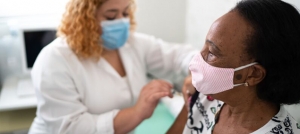Medicare Shared Savings Program saved Medicare $1.6 billion in 2021, says CMS
Nearly all ACOs - 99% - reported and met the quality standard required to share in savings under the Shared Savings Program.

Photo: Tempura/Getty Images
The Medicare Shared Savings Program, by working with Accountable Care Organizations, saved Medicare $1.66 billion in 2021 compared to spending targets, the fifth consecutive year the program has generated overall savings, according to the Centers for Medicare and Medicaid Services.
These savings were confirmed by the National Association of ACOs, which found that MSSP collectively saved Medicare $3.6 billion last year – $1.6 billion after accounting for shared savings payments. Of the 475 ACOs, 81% achieved savings to Medicare with 56% achieving shared savings.
NAACOS found the results particularly notable as 2021 was a year in which providers were still actively responding to the COVID-19 public health emergency. ACOs, the group said, were valuable assets in managing patient care "given their accountability to long-term patient care and outcomes."
"ACOs were proactive in their outreach to high-risk patients to keep them healthy, quickly established telehealth and remote monitoring capabilities to continue to provide care, and effectively managed home visits and post-acute care to reduce COVID transmission," said NAACOS.
Other ACO results included $357 in gross savings per beneficiary, 76% of shared savings only ACOs producing gross savings with an average savings rate of 2.5 and 89% of at-risk ACOS producing gross savings with an average savings rate of 4.7%.
Premier expressed its satisfaction with the results, but prompted Congress to pass the Value in Health Care Act of 2021 to continue emphasizing the transition from volume to value within the healthcare industry.
"The success of the MSSP program year after year solidifies ACOs as an innovation platform, and with additional flexibilities to attract new participants and modify benchmarking, can prove to be even more successful," Premier said in a statement.
WHAT'S THE IMPACT?
Shared Savings Program ACOs are groups of doctors, hospitals and other healthcare providers who collaborate to give coordinated, high-quality care to people with Medicare. When an ACO succeeds in both delivering high-quality care and spending healthcare dollars more wisely, the ACO may be eligible to share in the savings it achieves for the Medicare program, also known as performance payments.
Nearly all ACOs – 99% – reported and met the quality standard required to share in savings under the Shared Savings Program, according to CMS. ACOs had higher mean performance on quality measures compared to other clinician groups not in the program.
This includes higher performance for quality measures related to diabetes and blood pressure control; breast cancer and colorectal cancer, and falls risk screening rates; flu vaccination; tobacco screening and smoking cessation; and statin therapy for the treatment and prevention of cardiovascular disease. ACOs also had better performance on depression screening and depression remission rates.
About 58% of participating ACOs earned payments for their performance in 2021, said CMS. The types of ACOs that saw more net savings tended to be low-revenue, meaning they were mainly made up of physicians, included a small hospital, or served rural areas.
With $237 per capita in net savings, low-revenue ACOs lead high-revenue ACOs, which had $124 per capita net savings. Those ACOs were made up of 75% primary care clinicians or more and saw $281 per capita in net savings, compared to $149 per capita in net savings for ACOs with fewer primary care clinicians.
"Today's results again demonstrates that ACOs drive us towards a healthcare system that delivers affordable, equitable, high-quality, person-centered care," said Clif Gaus, Sc.D., president and CEO of NAACOS. "Eight years of continued strong performance with the positive proposed changes to the program included in the physician fee schedule sets the stage for significant growth in accountable care."
THE LARGER TREND
Over the past decade, the Shared Savings Program has grown to one of the largest value-based purchasing programs in the country, according to CMS. As of January, Shared Savings Programs include more than 525,000 participating clinicians who provide care to more than 11 million people with Medicare.
Based on the program's success, CMS has set a goal that 100% of people with Traditional Medicare will be part of an accountable care relationship by 2030.
Earlier this year, in the Calendar Year 2023 Physician Fee Schedule proposed rule, CMS proposed changes to the MSSP it said would promote participation among healthcare providers, especially in rural and underserved areas. In particular, the agency is proposing to incorporate advance payments to certain new ACOs in rural and underserved communities that could be used to address social needs – one of the first times Traditional Medicare payments would be permitted for such uses.
CMS is also proposing that smaller ACOs have more time to transition to downside risk, and a health equity adjustment to an ACO's quality performance score that would reward high-quality care delivered to underserved communities.
Additionally, the agency is proposing benchmark adjustments to encourage more ACOs to join the program and to maintain participation among current ACOs. If finalized, said CMS, these improvements and others would strengthen and grow the program, representing some of the most significant reforms since the program was established in 2011. Public comments on the CY 2023 Physician Fee Schedule are due by September 6.
ON THE RECORD
"The Medicare Shared Savings Program demonstrates how a coordinated care approach can improve quality and outcomes for people with Medicare while also reducing costs for the entire health system," said CMS Administrator Chiquita Brooks-LaSure. "Accountable Care Organizations are a true Affordable Care Act success story, and it is inspiring to see the results year after year. The Biden-Harris Administration and CMS are committed to a healthcare system that delivers high-quality affordable, equitable, person-centered care – and a Medicare program that can deliver just that."
Twitter: @JELagasse
Email the writer: jeff.lagasse@himssmedia.com













































